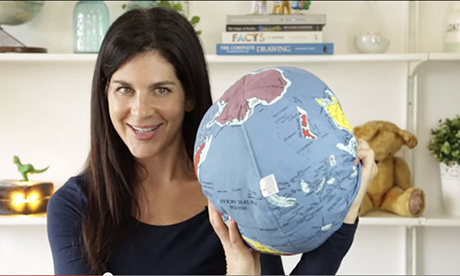Detective Dot: showing kids what’s what

Helping kids find out where things come from: Detective Dot creator Sophie Deen
People move around in London. Sophie Deen’s grandmother, for instance, lived on Mare Street and was a telephonist for the London Fire Brigade during the Second World War.
She moved up – or at least north – in the world to Clapton, and away west as the family’s prosperity grew.
Then, seventy years or so after the Luftwaffe’s final raids, at a time when modern-day LFB telephonists were tweeting S&M-related fire safety tips under the aegis ‘fifty shades of red’, Sophie Deen herself was back in Hackney, in search of the (increasingly rare, sadly) kind of office where you can dream up all-new cartoon characters and found your own ‘children’s content company’.
That company, Bright Little Labs, has just been selected to be part of the start-up accelerator programme Bethnal Green Ventures (which itself has moved around recently, and is actually based on the Strand).
Bright Little Labs will produce ‘story apps’ – interactive e-books which work a little bit like old school choose-your-own-adventure stories but with colourful dialogue boxes to decide on your next step rather than an invitation to roll a dice or turn to a certain page.
“I love comedy and I like funny cartoons – and when you look at how kids are being taught about a lot of stuff that’s really interesting, I think that it can be made quite boring very easily,” Deen says. “But equally cartoons can be really fun and just be more mindful and have better role-models in them.”
Deen’s central character is an eight year-old coding whizz named Detective Dot, who has a knack for computer languages as well as the magical ability to speak to the components of her electronics, and to her sidekick, a sarcastic drone.
Dot uses her coding know-how to untangle complicated stories of the modern everyday world, such as where the device on which a child is accessing the Dot stories comes from: in one episode she explains to an incredulous microchip that it is actually made up of sand from Brazil and copper mined in Uganda.
Broadening children’s horizons – along with those of anthropomorphised tech – is a central purpose of Detective Dot’s creation, and a key reason Deen’s company was accepted onto Bethnal Green Ventures, for which companies must have a social purpose. Dot covers a lot of bases.
First, her activities reveal some of the darker side of 21st century civilisation, which Deen sees as deaf to the excesses of its own supply chain.
“I started thinking people are good – I think that’s my view of humanity, that we’re good. But we, me and my friends and my family, when we’re buying stuff we’re not really thinking about who’s made it and what impact it has on other people and on the environment,” she reflects.
“Which is really weird, because I don’t think that most people want to support modern slavery or the oppression of others and we don’t want people on the other side of the world to not have opportunities or education or enough food to eat, but yet in our everyday items, in stuff that seems totally innocuous like our t-shirts or underwear or crockery or whatever it is, there’s this whole massive story wrapped up in it.
“You’re sort of trained not to think about how stuff’s being made.”
Second, Dot is there to break the mould of children’s characters. Dot is a girl and she’s not white. And she’s a girl who’s interested in tech and looks likely to have a promising career in STEM subjects (science, technology, engineering, and mathematics) ahead of her.
“The minute we pop out the womb there are these messages coming at us all the time about how we should be and what we should do,” says Deen.
“I think that stereotyping is just crazy in the kids world, through their books and their toys and the things that they see on TV, the marketing aimed at them. And I think it’s a huge problem and it shapes the way they see themselves and it shapes the way they see the world.”
The genesis of Dot was Deen’s year at the children’s charity The Place To Be, in Wembley, where these messages were disrupted: “in our playroom we had really cool toys, these toys I’d never seen before or thought of before,” she recalls.
“Figurines that had disabilities, a lot of colour, like a lot more than I’d seen in normal toys. And I started to really think about ‘how come I’ve never seen these dolls in normal kids shops, why aren’t they around?’”
Future iterations of the app promise problem-solving and coding-related interactive sections. For now, it’s narrative, illustrations, choice, and a wider colour palette than is common in kids’ media.
More information can be found on the Detective Dot kickstarter page
